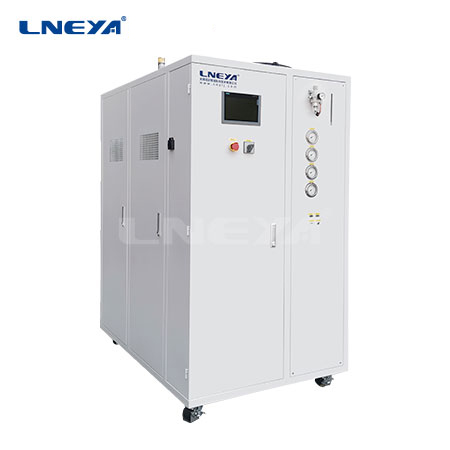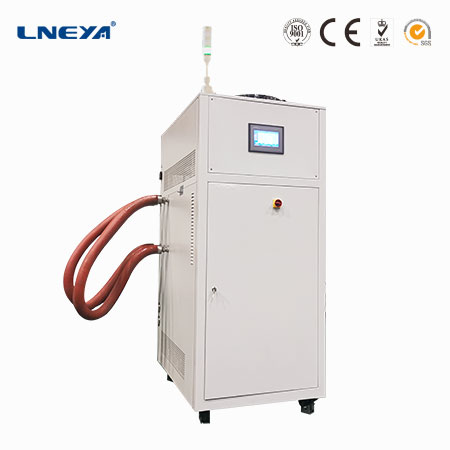What types of chillers are required for OBC testing?
The On Board Charger (OBC) test chiller plays an important role in the development and testing of electric vehicles (EVs) and plug-in hybrid electric vehicles (PHEVs). OBC is a key component of the electric vehicle charging system, used to convert alternating current into direct current for charging the vehicle battery. Due to the large amount of heat generated by OBC during operation, a cooling machine is required during the testing process to simulate the thermal management of OBC under actual usage conditions.
The following are the main functions of the OBC test chiller:
Thermal performance evaluation: The OBC test cooler can help evaluate the thermal performance of the OBC under different working conditions, including heating and cooling efficiency at different charging powers.
Temperature control: By precisely controlling the temperature, it ensures that the OBC can simulate the temperature environment under real usage conditions during the testing process, which is crucial for evaluating the performance and reliability of the OBC.
Thermal management test: Test the performance of the OBC’s thermal management system under different working conditions to ensure that it can effectively control the temperature of the OBC and avoid faults caused by overheating.
Performance consistency testing: By conducting tests under different temperature conditions, evaluate the performance consistency of OBC at different environmental temperatures, ensuring that OBC can operate stably in various temperature environments.
Reliability testing: Run the OBC for a long time and conduct tests under different temperature conditions to evaluate the long-term stability and reliability of the OBC.
Fault simulation test: Simulate fault conditions such as overheating to evaluate the fault response mechanism and recovery capability of OBC.
The types of test chillers for On Board Chargers (OBCs) are divided into the following categories:
Air cooled cooling type: cooled by forced air flow such as a fan, suitable for medium-sized OBC testing, and can provide good cooling effect.
Water cooled cooling type: • Single cycle water cooling: using a single coolant circulation system, suitable for medium-sized OBC testing Dual cycle water cooling: using two independent cooling cycles, the outer cycle is used for heat exchange with the OBC, and the inner cycle is used to cool the coolant in the outer cycle. It is suitable for high-performance OBC testing and can provide more stable temperature control.
Liquid cooled chiller: • Direct liquid cooling: Directly introducing coolant into the interior of the OBC for heat exchange, suitable for high-performance OBC testing and providing efficient thermal management Indirect liquid cooling: Indirectly exchanging heat with OBC through a heat exchanger, suitable for various types of OBC testing.
Refrigerant chiller: • Compressor refrigeration: uses refrigerant to circulate through the compressor for cooling, suitable for high-performance OBC testing, and can provide precise temperature control.
Our LNEYA OBC test chiller records temperature data and other key parameters during the testing process for subsequent data analysis and performance evaluation, ensuring that the OBC can take appropriate protective measures such as automatic power-off or cooling in case of abnormal conditions such as overheating.
In summary, the OBC test chiller is one of the key equipment for evaluating the performance and reliability of OBC. By simulating the temperature environment under real usage conditions, it ensures that OBC can work stably and efficiently under various temperature conditions. This is crucial for the overall performance and user experience of electric vehicles.
Vehicle Component Test Chiller
- MORE
KRY -40℃~+100℃ (1to6)
Product data downloadtemperature control, flow controlParameters DetailedProductDescriptionrecommend products The components are cooled and heated internally through ethylene glycol aqueous solution for testing -40 ° …
- MORE
KRY -40℃~+100℃ (1to1)
Temperature control in the testing process of new energy vehicle componentsParameters DetailedEquipment appearanceGeneral equipmentMultichannel equipmentMulti channel independent temperature controlVariable frequency regulationClient AClient BAppl…
- MORE
KRY -40℃~+100℃ (1to2)
Product data downloadParameters DetailedProductDescriptionYou may also be interested in these products Temperature range is -40℃~+100℃, which can be extended to +135℃ according to the actual situation, and the temperature contro…
- MORE
KRY -40℃~+100℃ (1to3)
Product data downloadKRY -40℃~100℃ 1&3S (3 sets of auxiliary temperature control, Pressure/Flow controlled separately)ProductDescriptionYou may also be interested in these products Dimension(A) cm Temperature r…
loading…
已经是到最后一篇内容了!
 LNEYA Industrial Chillers Manufacturer Supplier -
LNEYA Industrial Chillers Manufacturer Supplier -















